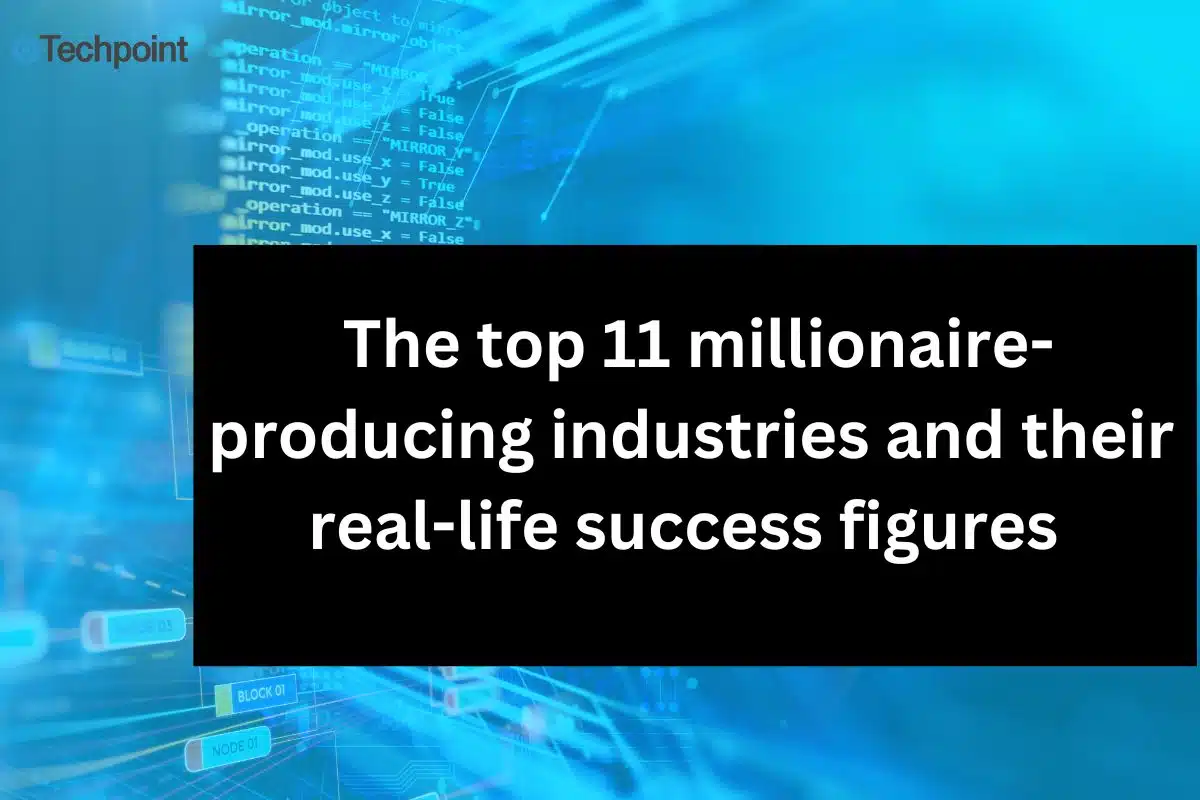I bet you sometimes find yourself wondering why some people achieve financial independence while others struggle and attain none? Oftentimes, the answer isn’t really about the universe being all choosey and thus heaping greater luck on some rather than others, but more about the industries one chooses to work in or invest in.
Fortunately, this article has the answers that point towards the where and where that has repeatedly proven to be the breeding ground for millionaires. It also offers insights into the key opportunities that make these sectors so lucrative and names real-life success figures who demonstrate their potential. If you’ve ever wanted to position yourself in a high-growth, wealth-creating space, this is your chance to learn how to do it.
Stay with me!
Industry | Best Suited For |
| Finance and investment | Individuals with analytical skills who are interested in wealth management and investment strategies. |
| Technology and E-commerce | Tech-savvy entrepreneurs, developers, and innovators looking for rapid scalability and growth. |
| Real Estate | Those with a keen eye for property valuation and management who are seeking stable long-term investments. |
| Healthcare and Biotechnology | Professionals with a background in medicine or biotechnology, interested in innovative healthcare solutions. |
| Renewable Energy | Entrepreneurs passionate about sustainability and environmental conservation, with a focus on energy solutions. |
| Manufacturing | Industrialists and engineers interested in production and supply chain management. |
| Entertainment and Media | Creative individuals with a talent for storytelling, music, or film production. |
| Fashion and retail | Designers and marketers with a flair for style and brand management. |
| Agriculture and food production | Farmers, agronomists, and entrepreneurs interested in sustainable farming practices and food production. |
| Aerospace and transportation | Engineers and innovators with a passion for space exploration and advanced transportation systems. |
| Education | Educators and entrepreneurs interested in developing innovative learning platforms and educational resources. |
1. Finance and Investments
The finance and investment sector, which focuses on wealth management, investment banking, fintech innovations, and cryptocurrency, precedes as a leading millionaire-producing industry globally. Over 35% of self-made billionaires have roots in finance-related ventures. However, achieving millionaire status typically takes about 10 years, though fintech startups and early cryptocurrency investments have accelerated this timeline for some individuals.

Wealth management is a lucrative field in finance, as it involves advising high-net-worth individuals on investments. Fintech also offers opportunities through digital payment systems or robo-advisors. Early investments in cryptocurrencies like Bitcoin or Ethereum have yielded returns exceeding 10,000%.
Michael Bloomberg made his fortune by founding Bloomberg LP, which provides financial data to investors worldwide. His innovative approach to delivering market insights made him one of the wealthiest men globally. Warren Buffett, another finance icon, reached the millionaire status through value investing,
2. Technology and E-Commerce

Technology and E-commerce is the second fastest millionaire-producing industry driven by advancements in AI and SaaS platforms. The U.S. e-commerce market is projected to reach $1.3 trillion by 2025, with tech startups dominating more space. Tech entrepreneurs often achieve millionaire status within an average of 4–5 years, with persons like Mark Zuckerberg reaching $1 million in less than 2 years.
AI development for automation tools and creating e-commerce platforms for global sales are key areas of focus on tech. Mark Zuckerberg co-founded Facebook (now Meta), transforming social media into a global powerhouse that generates billions annually. His success story highlights the potential for rapid wealth creation in the tech sector.
3. Real Estate

The third industry is Real estate, which benefits from urbanization and rising property values. Depending on investment scale and location, it typically takes between 6 and 8 years to reach millionaire status here. Real estate offers opportunities in property development, generating rental income from multi-family properties, and flipping houses by buying undervalued properties, renovating them, and reselling them for profit.
Grant Cardone acquired wealth by investing in multi-family real estate properties and leveraging rental income for long-term financial growth. His approach emphasizes the importance of strategic property investments in building wealth. Due to its tangible assets and consistent demand, real estate will always remain a reliable choice for wealth creation.
4. Healthcare and Biotechnology

The healthcare sector is expanding due to telemedicine and personalized medicine innovations. Healthcare entrepreneurs often reach millionaire status within 7–10 years, though biotech innovations can speed up this timeline. This industry’s main focus areas are Telemedicine platforms for remote healthcare services and pioneering biotech innovations like gene-editing technologies. Also, creating medical devices such as wearable health monitors offers significant opportunities.
In 2013, Dr. Rodger Novak co-founded CRISPR Therapeutics, a pioneering gene-editing technology that addresses genetic disorders while creating immense wealth. His success highlights the potential for biotech to transform lives and generate wealth. Healthcare is an essential sector with consistent demand, making it a stable choice for entrepreneurs.
5. Renewable Energy

Renewable energy is gaining traction worldwide due to climate policies and declining costs for solar and wind technologies. Entrepreneurs in this sector typically achieve millionaire status within an average of 8–10 years, mainly through government incentives. Solar panel installation for homes and businesses, energy storage solutions like lithium-ion batteries, and carbon credit trading are key opportunities to capitalize on.
Elon Musk used Tesla’s electric vehicles and solar energy projects to build a fortune while promoting sustainability. His success story showcases how renewable energy can be both profitable and environmentally conscious. As the world shifts toward sustainable living, this sector offers significant growth potential.
6. Manufacturing

Manufacturing is a cornerstone of economic growth, with advanced manufacturing driving efficiency and profitability. Depending on the scale of operations, it typically takes between 7 and 10 years to reach millionaire status. The key focus areas are Robotics for industrial automation and creating niche products like customized machinery or 3D printing applications. Additionally, developing portable housing solutions addresses global urbanization challenges.
Patrice Motsepe became South Africa’s noticeable billionaire by investing in mining and industrial equipment manufacturing. His success reconfirms the potential for manufacturing to drive economic growth and wealth creation in emerging markets.
7. Entertainment and Media

The entertainment industry is booming daily, fueled by digital content creation and streaming platforms like Netflix, Spotify, YouTube, Hulu, Prime, etc. Success timelines vary widely but can be rapid for viral content creators or blockbuster productions. Film production or music publishing rights, digital content monetization through platforms like YouTube or TikTok, and streaming services targeting niche audiences globally are key opportunities.
Beyoncé got financially liquid through music production, endorsements, and investments in fashion brands. Her achievement showcases how entertainment can be a lucrative path to wealth, especially with the rise of digital platforms.
8. Fashion and Retail

Fashion is a high-margin industry that combines creativity with commerce, offering opportunities in luxury goods and apparel. The global fashion market is driven by fast fashion and sustainable brands. It typically takes between 5–10 years to reach millionaire status in this sector. Luxury brands and sustainable fashion lines that appeal to environmentally conscious consumers are key areas of focus.
Ralph Lauren turned his clothing brand into a billion-dollar empire by focusing on timeless designs and premium quality. His prosperity resounds in the ability of fashion to create wealth through brand recognition and quality products.
9. Agriculture and Food Production

Agriculture is experiencing a resurgence due to innovations like agritech and organic farming, which meet the growing food demand. The sector is driven by technological advancements and the increasing demand for sustainable food sources. It typically takes between 8 and 12 years to reach millionaire status in agriculture. Investing in agritech startups and developing organic farming practices are key opportunities.
Howard Buffett invested heavily in sustainable agriculture practices that generated wealth and addressed food security challenges. His approach emphasizes the importance of innovation in agriculture for both profitability and social impact.
10. Aerospace and Transportation

The aerospace sector is driven by innovations in air travel and space exploration. Due to high initial investment costs, it typically takes more than 10 years to reach millionaire status. Key focus areas are developing autonomous vehicles, investing in space exploration technologies, and creating logistics systems that streamline global trade.
Elon Musk’s SpaceX revolutionized space transportation while creating immense wealth through commercial space exploration. His success story highlights the potential for aerospace to drive innovation and wealth creation.
11. Education (Including EdTech)

Education technology (EdTech) is one of the fastest-growing sectors, fueled by online learning platforms and digital educational resources. Entrepreneurs in EdTech often achieve millionaire status within 5–7 years. Key opportunities include developing online courses, creating educational software for schools, and investing in platforms that offer personalized learning experiences.
Salman Khan founded Khan Academy as an online platform offering free educational resources globally while attracting significant philanthropic funding. His status highlights that EdTech can transform education and create wealth through scalable digital platforms.
Comparative markers of these industries
| Industry | Growth Rate (%) | Timeframe to First Million (Years) | Risk Level (Scale: 1–100) | Key Opportunities | Real-Life Success Figures |
| Finance | 6.5 | 10 | 45 | Fintech, wealth management | Michael Bloomberg |
| Technology | 12 | 4–5 | 85 | AI development, SaaS platforms | Mark Zuckerberg |
| Real Estate | 5 | 6–8 | 50 | Rental income, property flipping | Grant Cardone |
| Healthcare | 6.7 | 7–10 | 20 | Telemedicine platforms | Dr. Rodger Novak |
| Renewable Energy | 8.3 | 8–10 | 40 | Solar panels, carbon credits | Elon Musk |
| Manufacturing | 4–6 | 7–10 | 35 | Robotics, portable housing | Patrice Motsepe |
| Entertainment | 7.2 | Varies | 80 | Digital content monetization | Beyoncé |
| Fashion | 6.6 | 5–10 | 55 | Luxury brands, sustainable fashion | Ralph Lauren |
| Agriculture | 9 | 8–12 | 70 | Agritech innovations, organic farming | Howard Buffett |
| Aerospace | 5.8 | >10 | 90 | Space exploration, autonomous vehicles | Elon Musk |
| Education | 16 | 5–7 | 60 | Online learning platforms | Salman Khan |
How to know which Industry is right for you
Here’s what I’d recommend as workable approaches:
- Evaluate your skills and interests: Identify your strengths, whether technical, analytical, or creative. This way, you don’t just go with the crowd or current trend. For illustration, say everyone in your orbit happens to go into web development, which is good but requires analytical prowess. But you’re a creative person who works best with cloth making and styling. Registering in web development would take a toll on you since it’s not your greatest strength.
- Assess market demand: Look at trends and future projections for your industry of interest. While you cannot predict the future status of the job market, and change is constant, there are patterns to each job demand, and data experts make evaluations based on these. Be attentive to them, and your assessment will be easy.
- Calculate your risk stamina: Understand the risks and failure rates associated with your chosen sector and weigh how much you can take. This helps determine if the time you’d spend on it would bring back value since time is actually irretrievable, unlike money.
- Network: Connect with professionals in your desired industry to gain insights. No one knows what happens in a room unless they have been in it. Leverage social media platforms to find and connect with industry know-how. Listen to their input, weigh them, and discuss offline with career clique groups you’re part of.
- Take action: Start small, and don’t be afraid to pivot if necessary. Starting small here doesn’t mean not giving it big enough attention and dedication; it just means that you’re not overthinking how it would turn out, thereby inviting what-ifs into the cracks of your mind, but getting in with a receptive and achieving mindset, which works wonders when we step into unfamiliar territories.
There you have it,
These industries represent more than just success stories; they’re opportunities waiting for someone like you to step in and prosper. The channels are clear: evaluate your skills and interests, assess market demands, calculate risk limits, choose your industry, commit to the process, and act decisively. As stated earlier, financial success isn’t reserved for the lucky or the privileged by a mighty hand we do not see; it’s earned by those who dare to take the first step into green grounds. Your financial future is in your hands, and with this article, you now have the insights to make informed decisions. So go ahead and turn this knowledge into your next big win.
But don’t think you’re leaving before we chat. After reading this article, do you have any questions you would like clarified? Or have you already started out in any of these industries? How has it been so far? Do you have reservations or personal cool observations? I want to hear everything!











